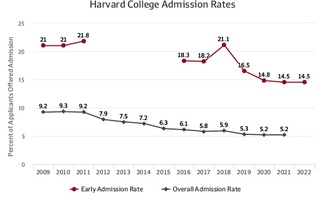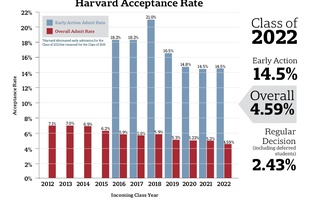{shortcode-0afe4d68c85a013525099832f466827686a9cc99} UPDATED: March 31, 2017 at 1:21 a.m.
Harvard admitted 5.2 percent of applicants to the College’s Class of 2021 Thursday, accepting 2,056 students of the nearly 40,000 applicants and posting an acceptance rate roughly equal to that of last year.
Harvard offered 1,118 students admission to the College Thursday through the regular application process. They join 938 applicants who were notified of their acceptance last December under the early action program into the Class of 2021.
After receiving a record 39,506 applications, the College’s acceptance rate is marginally lower than that of the previous year—5.20 percent this year, versus 5.22 percent for the Class of 2020.
The pool of accepted students represents a small decrease in total percentage of minorities from previous years, with largest decreases in Latino admits—from 12.7 percent for the Class of 2020 to 11.6 percent for the Class of 2021—and Native American admits, from 2.2 percent to 1.9 percent.
Certain racial groups, however, did see increased representation. African American students make up a record-high 14.6 percent of admitted students, an increase from 14.0 percent last year.
Amid a lawsuit alleging that Harvard discriminates against Asian American students in its undergraduate admissions processes, Asian American students make up a 22.2 percent of the admitted class, up marginally from a then record-high 22.1 percent last year.
Students who will be the first in their family to attend college comprise 15.1 percent of the admitted pool. The College will dedicate a new part-time “student advocate” to advising first-generation and low-income students, though Dean of the College Rakesh Khurana rejected a proposed summer program tailored towards those students earlier this semester.
Dean of Admissions and Financial Aid William R. Fitzsimmons ’67, a first-generation college student himself, attributed the slight increase in part to the “startup grant,” a program started last fall that gives approximately one-fifth of incoming Harvard freshmen—many of whom are first-generation—$2,000 to adjust to extra costs in the first months of college.
“I’m very excited because I would have received one,” Fitzsimmons said. “I think you end up with enormous freedom and flexibility, especially in that critical first year.”
Slightly less than half—49.2 percent—of the accepted students are women, up from 48.4 percent the previous year.
In a slight downward trend, 15.5 percent of students indicated interest in studying the humanities, down from 16.9 percent the previous year. A plurality—26.5 percent—indicated interest in the social sciences, while 19.3 percent said they planned to study computer science and engineering.
International students comprise 11.4 percent of the admitted pool, and Fitzsimmons said he did not see an impact on international applications despite uncertainty generated by President Donald Trump’s recent orders limiting travel and immigration from a number of countries.
Fitzsimmons said the admissions department’s decisions were partly influenced by a report published last year encouraging admissions officers to evaluate college applicants beyond academics and traditional extracurriculars.
“I look at [the report]’ as one of these really important long-term efforts of breaking down stereotypes of what colleges are and what they’re trying to do,” he said. “We value whatever it is that people have done in addition to study.”
Admitted students will have the opportunity to stay at Harvard for Visitas, which is scheduled to run from April 22 through 24. Students will then have until May 1 to respond to their offer of admission.
Applicants to the seven other Ivy League schools also received admissions decisions Thursday. Yale—which will open two new residential colleges in the fall—accepted a record 2,272 students, or 6.9 percent of its total applicant pool. Columbia posted the second-lowest acceptance rate in the Ivy League, at 5.8 percent, while Princeton offered admission to 6.1 percent of applicants. Elsewhere in Cambridge, MIT accepted 7.1 percent of its applicants earlier than this month.
—Staff writer William S. Flanagan can be reached at will.flanagan@thecrimson.com. Follow him on Twitter @willflan21.
—Staff writer Michael E. Xie can be reached at michael.xie@thecrimson.com. Follow him on Twitter @MichaelEXie1.
Read more in College News
Khurana Rejects Summer Program for Low-Income StudentsRecommended Articles
-
 College Accepts 14.5 Percent of Early Applicants to Class of 2021
College Accepts 14.5 Percent of Early Applicants to Class of 2021 -
 Record-High 84 Percent of Admitted Students Will Join Class of 2021
Record-High 84 Percent of Admitted Students Will Join Class of 2021 -
 College Admits 14.5 Percent of Early Applicants to Class of 2022
College Admits 14.5 Percent of Early Applicants to Class of 2022 -
 Record-Low 4.59 Percent of Applicants Accepted to Harvard Class of 2022
Record-Low 4.59 Percent of Applicants Accepted to Harvard Class of 2022 -
 82 Percent of Admits Plan to Join Class of 2022
82 Percent of Admits Plan to Join Class of 2022













